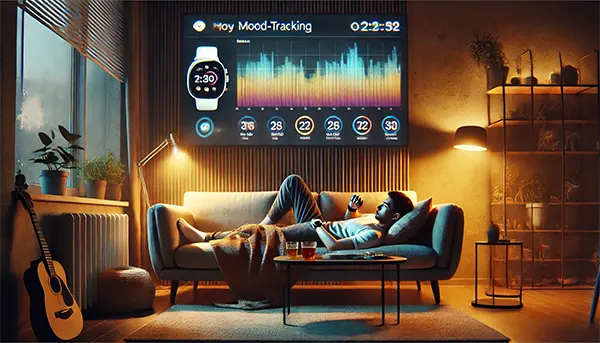Techno-Introspection: How Digital Diaries and Trackers Are Reshaping Our Minds
In an era increasingly defined by data, the ways we think, behave, and perceive ourselves are undergoing a profound transformation. Digital diaries, mood trackers, fitness apps, and journaling platforms have moved beyond simply recording daily habits — they now play an active role in shaping users’ mental frameworks and decision-making processes. This phenomenon, often referred to as techno-introspection, is redefining the concept of self-awareness in the digital age.
The Rise of Digital Self-Monitoring Tools
The popularity of self-tracking tools has surged dramatically over the past decade. In February 2025, leading apps such as Daylio, Reflectly, and Notion boast millions of active users who use them not just for task management, but for emotional reflection and behavioural tracking. These platforms integrate artificial intelligence to detect mood trends, prompt gratitude entries, and recommend wellness routines, subtly nudging users to adapt their behaviour based on their digital reflections.
These tools provide users with instant feedback, turning introspection into a gamified, habitual practice. This shift has been particularly impactful in mental health care, where apps like Moodpath and Woebot are being used as early-detection tools for anxiety and depression. Such digital companions can act as a bridge between patients and professionals, empowering individuals with data-backed self-awareness.
Furthermore, digital diaries help users recognise patterns they may otherwise overlook. For example, someone recording their sleep patterns and mood may identify correlations between caffeine intake and irritability, or work stress and insomnia. The ease of capturing such data through wearable devices or intuitive mobile apps contributes to a deeper understanding of behavioural triggers and supports informed life choices.
Psychological Impact of Continuous Self-Tracking
While digital self-monitoring can enhance awareness, it also raises psychological concerns. Over-reliance on quantified self-tools can lead to obsessive behaviour, where users feel compelled to measure every detail of their lives. This can foster anxiety, as users may begin to equate self-worth with productivity scores or mood stability charts.
Moreover, the presence of constant tracking can inadvertently distort one’s perception of spontaneity. When every action is documented and analysed, the freedom to simply “be” is reduced. Individuals may second-guess their choices or emotions, influenced not by how they feel, but by how their apps interpret those feelings.
However, when used mindfully, digital diaries and trackers can facilitate constructive introspection. They help externalise internal experiences and offer a structured path to understanding oneself, provided users avoid the trap of perfectionism or dependence on digital validation.
The Role of AI and Personalisation
AI integration has dramatically increased the efficacy and appeal of digital introspection tools. Platforms now use machine learning algorithms to tailor questions, generate insights, and create personalised growth plans based on a user’s history. For instance, apps like Replika or Stoic adapt their tone and interaction style based on user input, mimicking a personal coach or therapist.
February 2025 marks a tipping point in how these AI-powered trackers influence user cognition. They do not merely record feelings — they interpret and respond to them, forming a feedback loop that actively shapes the user’s mental narrative. This growing sophistication raises new ethical questions about the influence such tools exert on decision-making.
While personalisation increases engagement, it also means users are more likely to trust the app’s suggestions. This can be empowering but also potentially manipulative if not regulated properly. Companies now face pressure to maintain transparency about how user data is used and how AI models generate insights to ensure digital well-being is prioritised over monetisation.
Ethics and Data Sensitivity
One of the most pressing concerns surrounding techno-introspection is data privacy. The sensitive nature of mental health data, personal reflections, and biometric feedback collected by apps necessitates robust protections. Regulatory frameworks like GDPR have taken steps to address this, but enforcement and compliance remain inconsistent across regions.
There is also growing scrutiny around how this data is monetised. Some platforms offer “freemium” models, where user data may be analysed to personalise ads or sold to third-party analytics firms. This creates a tension between the benefits of self-knowledge and the risks of digital exposure.
To safeguard users, many developers are now implementing end-to-end encryption, anonymous data aggregation, and opt-out mechanisms. However, digital literacy is essential — users must understand the implications of sharing their data and demand transparency and control from tech providers.

Techno-Introspection in Everyday Life
From students logging daily emotions to professionals tracking productivity and stress, techno-introspection has permeated nearly every demographic. In workplaces, tools like Evernote and Quantified Mind are being used to track cognitive performance and emotional engagement, supporting a data-informed approach to employee wellness.
Even in personal relationships, digital diaries are playing a role. Couples are using shared mood-tracking apps to better understand each other’s mental states and communication styles. This technological layer adds a new dynamic to intimacy and emotional intelligence, though it requires mutual consent and trust.
As techno-introspection becomes more embedded in daily routines, its influence on identity and cognition will only grow. The key lies in using these tools as facilitators of awareness rather than as authorities. When integrated thoughtfully, digital diaries can enrich the human experience by bringing clarity to the complexities of thought and emotion.
The Future of Digital Reflection
Looking ahead, the convergence of neurotechnology, AI, and behavioural science will likely produce even more sophisticated self-monitoring platforms. Brainwave-tracking headbands, real-time emotion recognition, and adaptive journaling interfaces are already in development in early 2025.
However, the future of digital introspection is not only about innovation — it is about intentionality. Developers, researchers, and users alike must co-create tools that are ethical, inclusive, and beneficial for long-term mental well-being. Balancing technological potential with human sensitivity will be the cornerstone of progress.
Ultimately, techno-introspection invites us not to outsource our self-awareness to machines, but to deepen it through partnership with them. When used with discernment, these tools can be powerful mirrors reflecting the nuances of the mind — not replacing introspection, but enhancing it.
